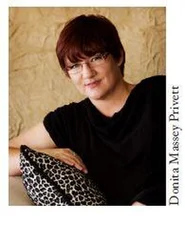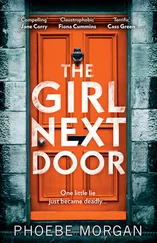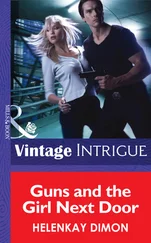He would have to tell people. The police perhaps. Those others he had been in the tunnels with. He would think about it and decide what to do next. He read the letter again, went into the kitchen to make himself tea, thought better of it and poured himself quite a stiff whisky instead. What he really wanted was someone to tell about this and ask their advice. There was no one. His life had been quite solitary since Jo died. Well, there was one. He would sleep on it, wait till morning and then he would phone Melissa.
Rosemary bought some pink wool and began knitting a jumper. It wasn’t for Sybilla or Callum or the new baby but for herself. She had finished the dress she had started once she got back from Freya’s and was wearing it when she went up to London in the tube. She had made few shopping trips to Oxford Street or Knightsbridge because Alan disliked shopping, like most men. While she tried on clothes, he sat on a chair provided by the assistant, apparently stunned by boredom and half asleep. Or else he waited outside, standing in the doorway or finding a seat to sit on while he dozed. This first trip since his departure she made alone, walking along Oxford Street to Selfridge’s and buying herself a pair of shoes and a handbag. She had all the time in the world and shopped slowly, choosing what she wanted as she had never done since she was a young girl. Then she walked to Regent Street and asked a taxi driver to take her to the Queen’s Theatre, where Les Miserables was showing. She had always wanted to see it but Alan never would.
The theatre was open for a matinee. She walked in, feeling suddenly shy and frightened, but made herself go up to the window inside which a girl sat and ask, wondering if she was making a fool of herself, for a seat in the stalls for the evening performance on Friday. Not a fool apparently. It all went through without a hitch and she had her ticket. Back now to the shops, but perhaps a walk round Trafalgar Square first. She found a place to eat lunch and again she wasn’t making a fool of herself. With her food she had a glass of wine and afterwards thought, why not take a taxi up to Holborn and go home from there? So she did and reached home in triumph. It had been good, it had been fun . And the shoes and bag were lovely. She sat down by the phone and phoned her daughter, her son and both her grandchildren, telling them all about her lovely day and learning that her new grandson’s name was Clement.
I have grown, she told herself, and I am still growing.
‘Why not come to me,’ said Melissa, ‘and I’ll cook something. I’d like to.’
So he went. Her house in a street off Chiswick High Street was nothing to look at outside but charming inside, with large elegant rooms and a pretty garden. She had made a salad and a rich hot paella. Lewis told her about the hands in the box and the group of people who had been in the tunnels, Michael Winwood and his mother and father and, of course, the letter from Noreen Leopold.
‘What do you want to do?’ Melissa asked.
‘I don’t know. Nothing, I suppose. But I have to answer her letter, and when I answer it I have to tell her about all of it. Or do I?’
‘Not necessarily. But I think you have to tell the others and the police. You all thought the hands were Michael Winwood’s mother’s and your uncle’s, but they obviously weren’t. Hers maybe but not your uncle’s. Whose was the other hand?’
‘I don’t know. No one can know.’
‘Surely Michael’s father knows and he’s still alive, isn’t he?’
‘I believe so,’ said Lewis. ‘Should I tell Michael first, do you think?’
She said he should. And quickly, perhaps as soon as he got home. ‘People who live to a hundred are always more or less at death’s door, aren’t they?’
Before making that phone call, Lewis sent Noreen Leopold an email. He told her to get in touch with him in March and that he would like to see her when she was here. The hands were not mentioned. They could talk about them, if necessary, when she came. He sat at his desk for quite a long time before dialling Michael’s number, even thinking that he need do nothing before Noreen’s visit. But it was too late for that now that he had consulted Melissa. He must phone and it would be best to get it over.
The room was very warm. Michael had come because Urban Grange had asked him to, telling him that his father had been unwell the evening before. They had hesitated and nearly sent for him at seven p.m., but the old man had rallied, had got up and shifted himself into an armchair. Some weeks before, John Winwood had asked Darren to buy him a print of ‘some famous picture’ and have it framed. This had been done, and it was bringing it to his room and showing it to him that occasioned the fast improvement in his health. This morning, Imogen said, Mr Winwood was a lot better but they still thought Michael might wish to come, as his father was so very old and it was impossible to tell how long he might last.
So Michael was there, disliking his father rather more than he had since his visits began after his aunt’s death. This feeling was exacerbated by the sight of the famous picture, a print of Dürer’s praying hands. The nursing home staff might, in their innocence, believe that John Winwood had bought it just because he happened to like the picture, but Michael knew very well that it was there, hanging up on the wall, because of the hands in the biscuit tin and what his father had done.
‘Like it?’
This was the first thing John Winwood said after their tea had been brought. Michael didn’t answer.
‘You always were sulky, a very sullen child.’ His father picked up the plate of biscuits but in trying to pass it to Michael, dropped it, scattering biscuits, bits of biscuits and crumbs on the floor. ‘Leave it,’ he said when Michael knelt down and tried to restore the fragments to the plate. ‘Let them pick it up. That’s what they’re paid for.’
Michael had meant to ask his father about the hands in the box, but since reaching that decision he’d realised he didn’t know who they belonged to. One was his mother’s? He didn’t really know that. Now that he had been told that James Rayment had died only about twenty years before, he didn’t know whose the man’s hand was either. Coming to Urban Grange had been pointless. He sat on, drinking his tea, then refilling their cups. His father left his standing there. He had leant his head back, closed his eyes and appeared to be fast asleep. Michael looked at the crumbs and the broken biscuits and left them there. He too closed his eyes, thought for a while about his children, so remote from him, as if they were not his at all, then about Vivien, so good, so loving, his treasure.
He still had his eyes shut when someone came in to take the tray. He heard her click her tongue, exasperated no doubt by the mess. Once she had gone, he sat up and looked at his father across the empty table. The older eyes opened. John Winwood said, ‘I’m not long for this world.’
Michael thought of telling him not to say that or to cheer up and be more hopeful. He didn’t. ‘I’ll be back,’ he said instead. ‘It won’t be long.’
CHAPTER TWENTY-FOUR
SEVERAL ATTEMPTS THAT Michael made to speak to Alan received no reply. Sometimes when a discussion seems the only course to take but efforts to secure that meeting repeatedly fail, the need for it grows less and less until it no longer looks important. Michael made one last attempt, and this time Alan answered. He had seemed a pleasant and thoughtful man to Michael since they had met at George Batchelor’s house after so many years, but his tone this time, if not exactly gloomy, was detached and preoccupied. Yes, they could meet, Alan said, but not in Hamilton Terrace, as he described Daphne’s house without using her name. He named a pub in Hampstead within walking distance of Michael’s house.
Читать дальше












